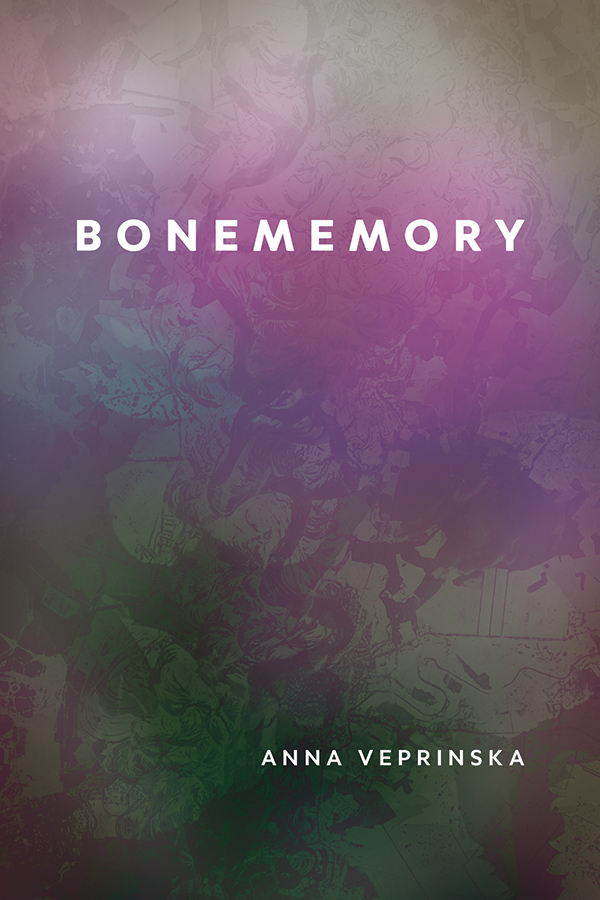
Bonememory
Anna Veprinska
$32.99 HC / $18.99 PB (T)
96 pages
6 x 9 inches
Hardback: 978-1-77385-610-0
Paperback: 978-1-77385-611-7
Epub: 978-1-77385-613-1
Library PDF: 978-1-77385-612-4
April 2025
Our memories, and the memories of others, live in our bones. These poems document personal, intergenerational, and collective trauma—and the astonishment of survival.
Memory is stored in the body. Memory sprouts in families and is transmitted from one generation to the next. Memory imprints at the level of bone. In Bonememory, Anna Veprinska bares down to the marrow.
An expert lyric poet writing at the intersection of memory and pain, Veprinska fearlessly traces intergenerational histories of struggle and survival. This collection confronts the indelible marks left by immigration, the Holocaust, Canadian settler-colonialism, and the Russian invasion of Ukraine. Amid these various upheavals, Veprinska finds herself within her own body, facing chronic illness and navigating disability.
Bonememory is an investigation of history and memory studded with moments of insight and revelation. Written with a keen eye and close attention, these poems balance lyrical tenderness and formal experimentation, never forgetting that extending into another can be an act of care and an act of invasion.
About the Author
Anna Veprinska is the author of Empathy in Contemporary Poetry after Crisis. She was a finalist in the Ralph Gustafson Poetry Contest, has been shortlisted for the Austin Clarke Prize in Literary Excellence, and received an Honourable Mention from the Memory Studies Association First Book Award. She is an assistant professor in the Department of English at the University of Calgary.
Veprinska’s deft tuning alerts readers to the semantics our worlds are built upon—a lingering influence indicative of powerful work.
—AlbertaViews Magazine
Veprinska is a puppeteer of poetry and matryoshka marionettes, healing trauma through empathy and memory.
—The Seaboard Review
Anna Veprinska’s Bonememory reaches for moments of connection and insight in the face of seemingly insurmountable tragedy, distance, and pain. With a knack for figurative language that is at once fitting and surprising, Veprinska probes at the limits of our intimacies, our communication, and our very understanding: “What could I know, really, / of the underbelly of her suffering? The same / each of us knows of each. Shadows, shadow.”
—Annick MacAskill, author of Shadow Blight and Votive
When you open Anna Veprinska’s poetry collection you will learn that bodies can be empty or full of stories, that comfort can be vultured and if you weep in the cemetery loud enough the stones might in fact turn their faces away, out of respect.
See, this is because Anna Veprinska knows that poetry shouldn’t be boring but should contain mysteries that reveal instead of confounding.
Here is my proof: ever wondered about Emily Dickinson’s dashes? They are buzzing as they let down their braided hair, Veprinska says.
Ever wonder what to dress your wounds in? In Saturday best, naturally, Veprinska suggests.
Every reader, upon entering a poetry collection, will have their favorite. my favorite Veprinska poem is when she is talking to God, as in pieces like Testimony, where the line-breaks explode with new meanings, and images move not unlike lungs when the almighty decides to say a thing or two, via moving your own lips, dear reader.
Here is a poet who knows all too well that language is here to wake us up, and she does it playfully, tenderly, unabashedly—and with style that is all her own.
—Ilya Kaminsky, author of Deaf Republic and Dancing in Odessa
Osip Mandelstam spoke of the rawness of poetic expression, the hurt, traumatic truths it can register and tell. The poems in Bonememory are, in this critical sense, often upsetting, disturbing established orders of words and meaning, the mechanically transmitted and received wisdoms of history and culture. There is nothing common about their sense or sensibility, and for all their musical skill and subtle accomplishment – brushes of sound, ink on bone – their candor (not always unflinching) cuts deep, leaving “bones/writhing like strings,” for “what healing can a scar hope for that is not another scar?” The collection is haunted by the Holocaust, a theme culminating in ‘Labyrinth’ when Veprinska’s right arm goes numb on a tour of Auschwitz (“sometimes/our bodies articulate/what our language cannot”); by the monstrous, war-torn fate befalling her native Ukraine, which she left as a young, Jewish, Russian-speaking child; by her ongoing sense, while writing poetry, of still being “Anja,/learning English” – a paradoxical source, I suspect, of her power; and by the bitter mercies of life in Canada, a supposedly peace-loving place founded on genocide and sustained by massive violence. “How much of this country,” she wonders four times in ‘Shoes,’ a poem about the mass-death of Indigenous children at residential schools, “is an unmarked grave?” For Veprinska, one senses – for she never preaches – the practice of poetry is in part an effort to mark such sites, to reembody language, reclaim both presence and absence, in raw and naked ways: to bring us back to the real life and death of bodies and selves. In this, Bonememory succeeds to an extent deserving to make a mark on the international literary landscape.
—Sean Howard, author of Unrecovered: 9/11 Poems and The Photographer’s Last Picture